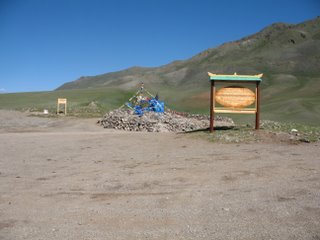Pagan* in a Christian Land, Christian in a Pagan Land

Two stories from my summer in Buriatia and Mongolia
One of the Buriat professors who hosted me was on an exchange trip to Vermont. She was by the way, the only Buriat professor I know whose business card is in Buriat and not in Russian -- I thought that was very cool.
Anyway, in Vermont, she wondered why all these beautiful places don’t have shrines to the local spirits. Certainly any place like that in Buriatia would. She suddenly realized, it’s just like the Buriats in Inner Mongolia, who don’t have local shrines either — Americans would like to have those shrines but they just don’t know who the local spirits are.
So she thought maybe she could start the ball rolling by leaving coins, and maybe a bottle of vodka, in particular fine places in Vermont for the spirits, so we’d know what to do too. But the rangers at the park where she was told her that that’s not allowed, you see, we call it litter.
In Ulaanbaatar, I met a fellow student of my mentor, from an East European country. She is a Christian as well, and had married a Mongolian man and was living in Ulaanbaatar, working as a journalist. One time, she was driving through the Mongolian countryside with some visitors, including ordinary Mongols and a Korean missionary.
When they crossed a mountain pass, they stopped at the top. The ordinary Mongols, of course, began the expected three clockwise circumambulations of the cairn, or oboo -- a pile of rocks marking an offering site for the local deities in the Buddhist cult -- at every high place in Mongolia. Her husband, although a Christian, began to make the same circumambulation by habit. As a good wife, she didn't want to show up her husband in front of other Mongols. She walked around the oboo with her children. Only the Korean missionary ostentatiously refrained.
Her children asked her, "Mom, why did we do that?" She replied, "It's like when you go to some new place, you acknowledge the people who are there. Walking around in a circle, were simply saying hello to the local spirits here -- not worshipping them, not putting ourself under them."
Now that the children are confirmed and have had first communion, she confessed, she's not sure she would handle it that way again, but that's what she thought was right then.*Pagan is used here not in any derogatory sense, but simply as the commonly used word for believers in "earth-based religions" -- among which Buddhism (in an ambiguous sense) is one.
UPDATE: I forgot to put up a picture of an oboo in Mongolia (go ahead, click on it, it's nice and big). This is one in Uws province. The sign is one asking people not to put empty bottles or other trash on the oboo, because the oboo, as a place for worshiping the local spirits, should be associated with a clean environment. So here you see an example of the assimilation of pagan categories to environmentalist ones.

<< Home